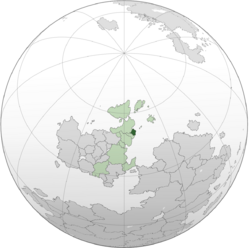LGBT rights in Azmara: Difference between revisions
No edit summary |
No edit summary |
||
| Line 152: | Line 152: | ||
|} | |} | ||
[[Category:Azmara]] | [[Category:Azmara]] | ||
[[Category:LGBT rights]] | |||
Revision as of 18:00, 14 December 2022
This article is incomplete because it is pending further input from participants, or it is a work-in-progress by one author. Please comment on this article's talk page to share your input, comments and questions. Note: To contribute to this article, you may need to seek help from the author(s) of this page. |
 Location of Azmara (dark green) in Euclean Community (light green) – [Legend] | |
| Status | Legal since 1855, age of consent equalised in 1974 |
| Gender identity | Right to change legal gender since 1989; self-identification since 2017 |
| Military | LGBT people allowed to serve openly in the military |
| Discrimination protections | Sexual orientation and gender identity/expression protections |
| Family rights | |
| Recognition of relationships | Same-sex marriage since 2004 |
| Adoption | Full adoption rights since 2004 |
Lesbian, gay, bisexual and transgender (LGBT) rights in the Commonwealth of Azmara are considered some of the most progressive in the world. Same-sex sexual activity was decriminalised in 1855 in the new republican legal code, yet laws against public indecency were often used to persecute LGBT individuals before 1974 when the age of consent was equalised. Since 1989, transgender individuals have been allowed to change their legal gender, with requirements for surgery being removed in 2009 and gender self-identification being introduced in 2017.
In 1992 the third government of Aarne Leifssun passed a law granting cohabitation rights to same-sex couples living together, yet this would be superseded in 2004 as Niina's Law was signed by President Liis Helmutsdohter, granting full marriage and adoption rights to same-sex couples. Since 1995, discrimination in employment and the provision of goods and services on the grounds of sexual orientation has been prohibited, with this being extended to gender identity and expression in 2009.
Polling has shown consistent support for LGBT rights in Azmara in the 21st century, with 85% of respondents responding in support of same-sex marriage in a 2017 JuGov poll. Aalmsted, especially the boroughs of Eleinasburg and Lilijenburg, has gained a reputation as being an LGBT-friendly city in recent years.
Laws regarding same-sex sexual activity
Between 1578 and 1794 under the jurisdiction of the Union of Groonbank-Westmaark under the Rudolphine Confederation and the Azmaran Confederation sodomy was defined as a crime with punishment often consisting of hanging or imprisonment. Briefly during the Weranian Republic's invasion and the creation of the Republic of Westmaark the anti-sodomy law was removed from the books, yet was reinstated after the Kingdom of Azmara was created in 1802 as Clause 193.
After the Revolution of 1855 created the Commonwealth of Azmara, a new legal code was created inspired by ideas of rationalism and secularism, with many laws regulating private sexual activity being removed from the code including Clause 193. However, laws criminalising indecency remained in the code as Clause 194 and were varyingly used to prosecute LGBT individuals, especially during the National Coalition government of 1923-1932. Furthermore, as no official law existed specifying an age of consent for same-sex sexual activity, homosexuals were sometimes arrested on charges of statutory rape.
This situation was addressed by the Radical minority government of Aleksaander Mâþijassun, with the government proposing a reform of laws regulating sexual conduct to officially set the age of consent for homosexual activity to 16 as it was for heterosexual activity and remove Clause 194 from the code to remove any legal grounds for the prosecution of consenting homosexual adults.